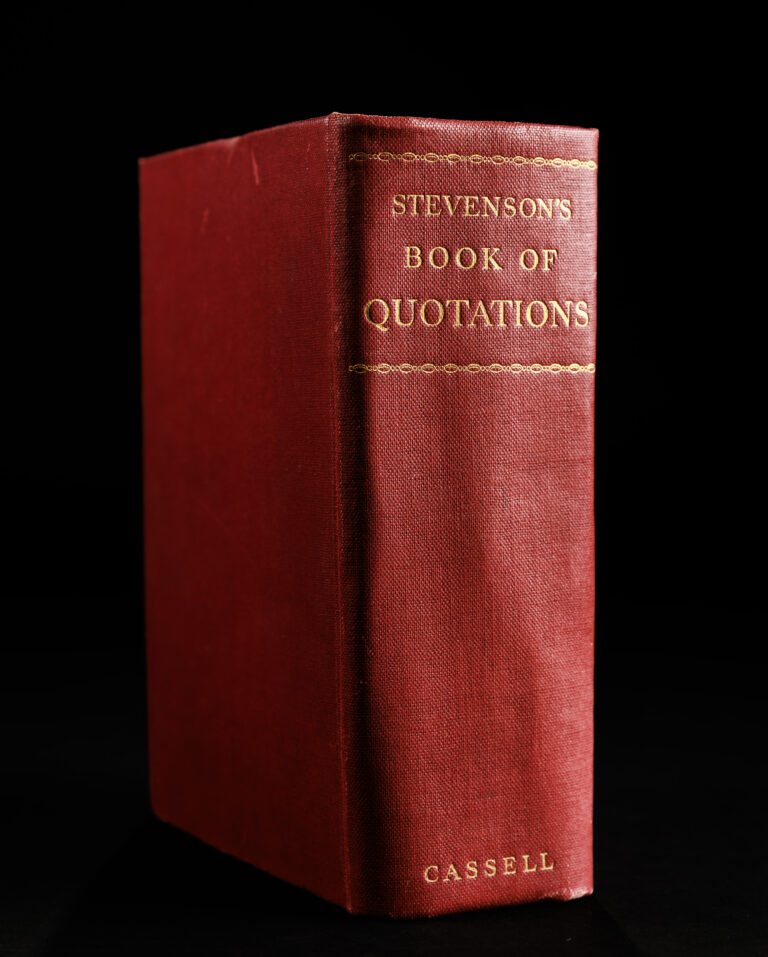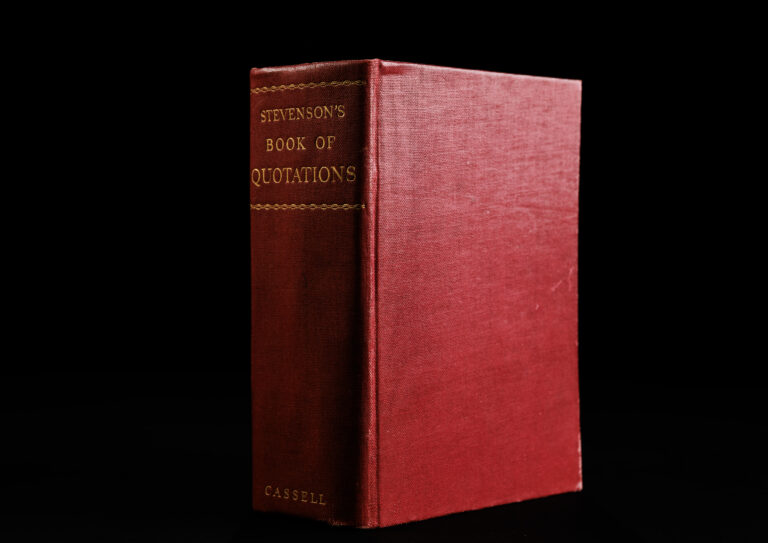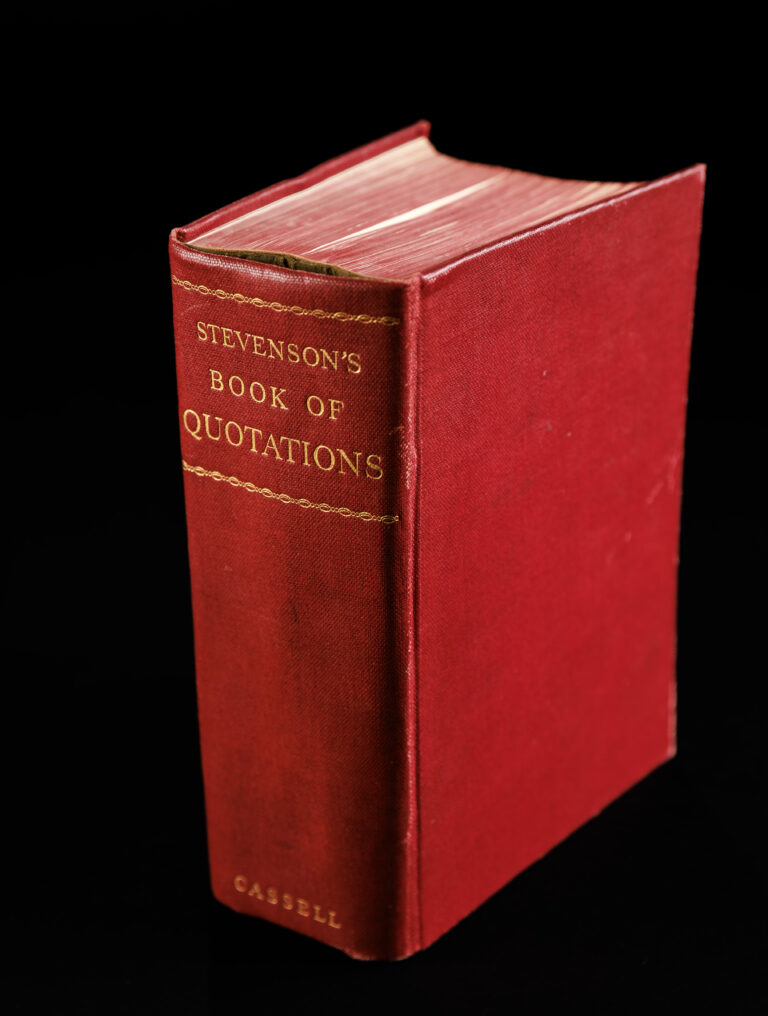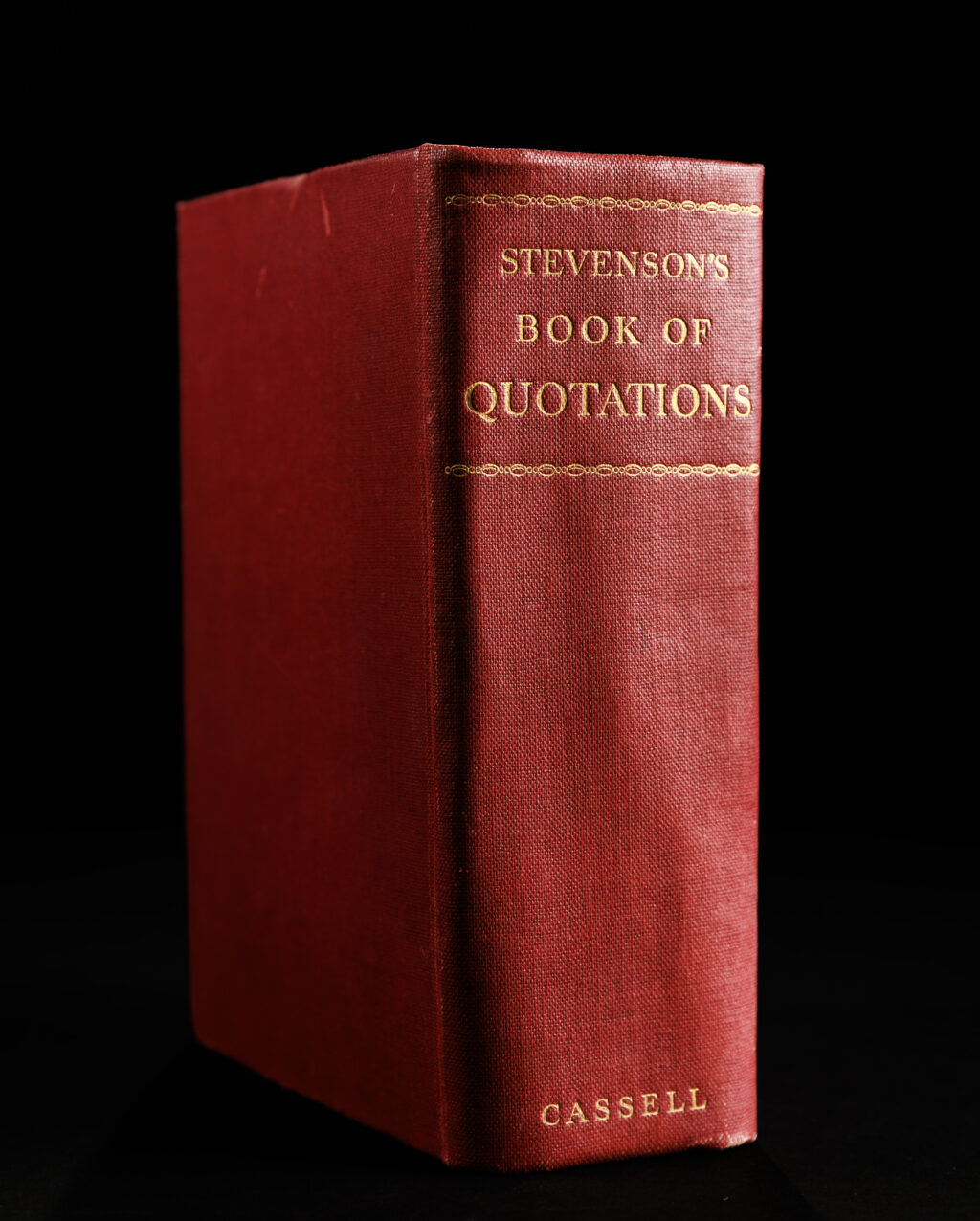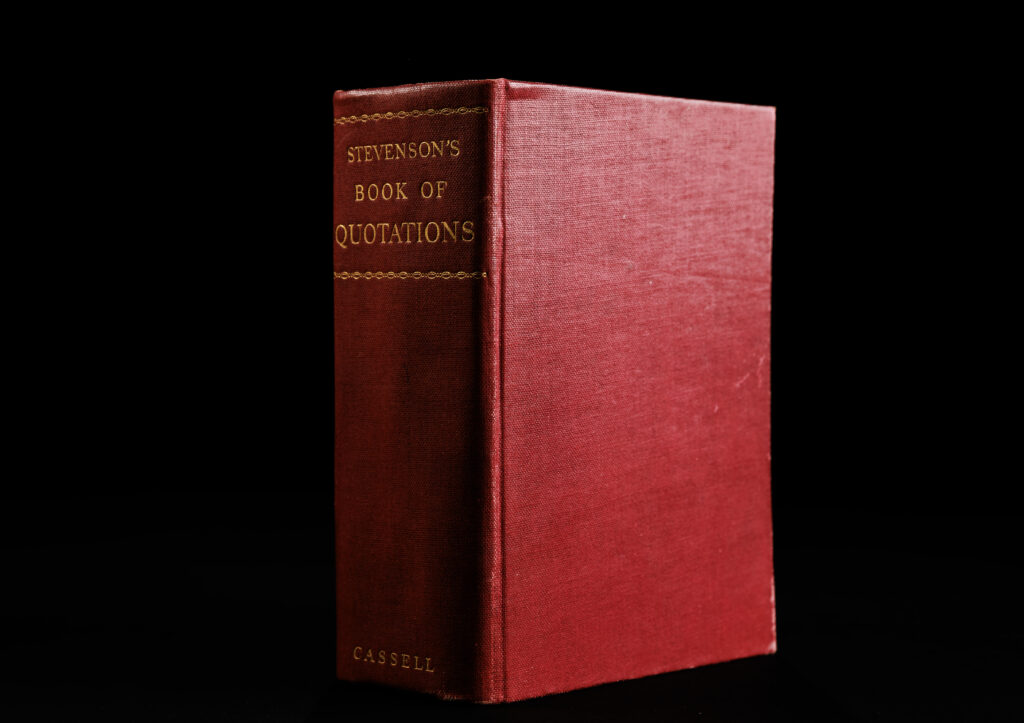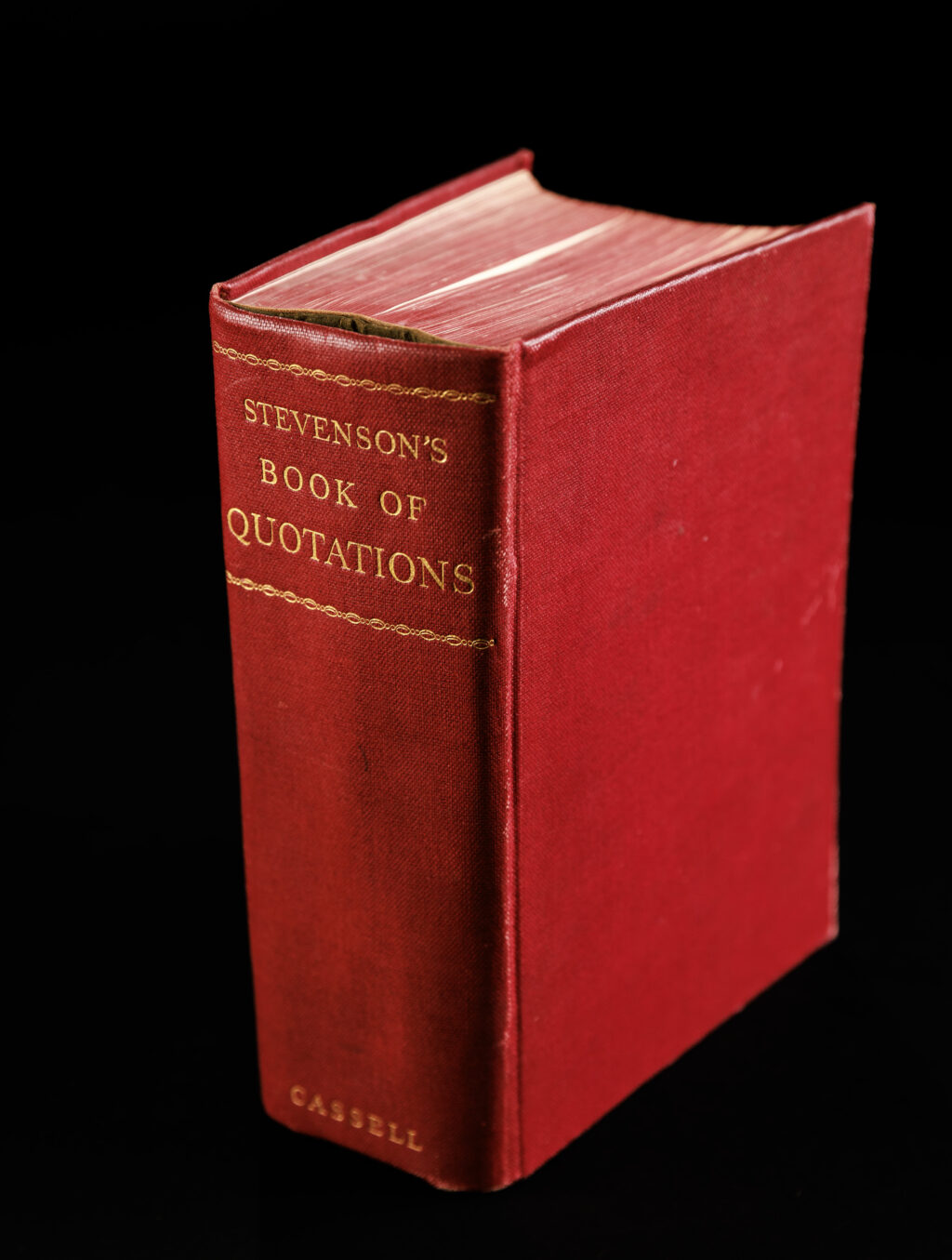| Entry type: Book | Call Number: 650 | Barcode: 31290035200252 |
-
Author
Stevenson, Burton
-
Publication Date
1936
-
Place of Publication
London
-
Book-plate
No
-
Summary
Signature: 1937.
-
Edition
Second (first published 1935)
-
Number of Pages
2605
-
Publication Info
hardcover
Copy specific notes
Bookplate inserted; “A.H. Spencer, Melbourne” bookseller stamp inside cover; inscribed in pencil on front endpaper: “R.G. Menzies 1937”.
Pencil markings and crosses in margins throughout text.
Quotes highlighted by Menzies include: “Absence diminishes little passions and increases great ones, just as the wind blows out the candle and fans the fire (L’absence diminue les mediocres passions, et augmente les grandes, comme le vent eteint les bougies et allume lef feu. (La Rochefoucauld, Maximes, No. 276.)
[p. 3]; “To see Kean act was like reading Shakespeare by flashes of lightning” (S.T. Coleridge. Table Talk) [p. 9]; “Speak the speech, I pray you, as I announced it to you, trippingly on the tongue: but if you mouth it, as many of your players do, I had as lief the town-crier spoke lines. […] (Shakespeare, Hamlet Act III, sc. 2, 1. 1. [p. 10]; “A fool always finds a great fool to admire him” (Un sot trouve toujours un plus sot qui l’admire.) (Boileau , L’Art Poetique. Pt. i, l. 232) [p. 14]; “The greatest object in the universe, says a certain philosopher, is a good man struggling with adversity; yet there is still a greater, which is the good man that comes to relieve it” (Goldsmith. The Vicar of Wakefield. Ch. 30) [p. 18]; Beware lest clamour be taken for counsel (Cavendum ne fiat pro consilio convicium.) (Erasmus, Senatulus) [p. 19]; “For just as I approve of the old man in whom there is some of the flavor. He who strives thus to mingle youthlessness and age may grow old in body but old in spirit he never will be.” (Cicero, De Senectute. Ch. xi, sec. 38) [p. 23]; “there is a wicked inclination in most people to suppose an old man decayed in his intellects. If a young or middle-aged man, when leaving a company does not recollect where he laid his hat, it is nothing; but if the same inattention is discovered in an old man, people will shrug up their shoulders and say “his memory is going.”” (Samuel Johnson. Boswell, Life, iv, 181) [p. 34]; “to be seventy years young is often far more cheerful and hopeful than to be forty years old” (O.W. Holmes, Letter to Julia Ward Howe, on her 70th birthday, 27 May 1889) [p. 37]; “The hoary head is a crown of glory; if it be found in the way of righteousness” (Old Testament, Proverbs, xvi, 31.) [p.38]; the beauty of old men is the grey head (Old Testament, Proverbs, xx, 29) [p. 38]; “the white locks, the blossom of old age. Sophocles. Electra, 1. 42.” [p. 38]; to complain about the age we live in, to murmur at the present possessors of power, to lament the past, to conceive extravagant hopes for the future, are the common dispositions of the greatest part of mankind (Edmunde Burke, Thoughts on the Cause of the Present Discontents)p. 42]; “When a man is no longer interested to do better than well, he is done for. (B. R. Haydon, Table Talk)
[p. 48]; “I am my own ancestor” (Marshall Andoche Junot) [p. 73]; “speak of the moderns without contempt and of the ancients without idolatry; judge them by their merits, and not by their age.” (Lord Cesterfield, Letters, 22 Feb., 1748) [p. 83]; “The idiot who praises, with enthusiastic tone, all centuries but this and every country but his own.” (W. S. Gilbert, the Mikado. Act i) [p. 83]; “He doth like the ape, that the higher he climbs the more he shows his ars.” (Francis Bacon, Promus. No. 924) [p. 84]; “You, O Books … are the golden vessels of the temple, burning lamps to be ever in the hand” Richard de Bury, Bishop of Durham, Philobiblon. Ch. 15. 1345 [p. 179]; “Charity is a virtue of the hear, and not of the hands” (Addison, The Guardian. No. 166) [p. 241]; the original charity scrimped and iced. In the name of cautious, statistical Christ.” (John Boyle O’Reilly, In Bohemia.) [p. 243]; “The common problem, yours, mine, every ones’, Is-not to fancy what were fair in life Provided it could be, but, finding first What may be, them find how to make it fair Up to our means.” (Robert Browning, Bishop Blougram’s Apology) [p. 293]; “Life cannot subsist in society but by reciprocal concessions” (Samuel Johnson, Letters to Boswell, 1766) [p. 294]; “He has out-soared the shadow of our night; envy and calumny, and hate and pain. And that unrest which men miscall delight. Can touch him not and torture not again; From the contagion of the world’s slow stain, He is secure, and now can never mourn A heart grown cold, a head grown grey in vain.” (Shelley, Adonais. St. 40) [p. 392]; “Democracy is based upon the conviction that there are extraordinary possibilities in ordinary people” (Harry Emerson Fosdick. Democracy) [p. 430]; “The great danger, as it appears to me, of representative government, is lest it should slide down from representative government to delegate government” (Helps, Friends in Council. Bk. i, ch. 6.) [p. 433]; “Democracy substitutes election by the incompetent many for appointment by the corrupt few.” (Bernard Shaw, Maxims for Revolutionists) [p. 434]; “There is no Royal Road to Geometry” (Euclid to Ptolemy I, when the latter asked if there was not some easier way to master the science.) (Proclus, Commentaria, in Euclidem. Bk. ii, chp. 4.) [p. 528]; “What does education often do? It makes straight-cut ditch of a free meandering brook.” (H. D. Thoreau, Journal, Oct., 1850.) [p. 530]; “the land where the yew-tree grows” (A Conan Doyle, The Song of the Bow. (The White Company)) [p. 551]; “An Englishman thinks he is moral when he is only uncomfortable” (Bernard Shaw, Man and Superman. Act iii.) [p. 561]; “It is the habit of an Englishman to sniff for doctrine everywhere” (Henry Arthur Jones, The Triumph of the Philistines: Preface) [p. 561]; “The only freedom which deserves the name, is that of pursuing our own good in our own way, so long as we do not attempt to deprive others of theirs, or impede their efforts to obtain it.” (John Stuart Mill, On Liberty) [p. 722]; “There will be no true freedom without virtue, no true science without religion, no true industry without the fear of God and love to your fellow-citizens. Workers of England, be wise, and then you must be free, for you will be fit to be free.” (Charles Kingsley, Placard, 1848) [p. 723]; “Freedom is political power divided into small fragments” (Thomas Hobbes, Maine Popular Government, p. 70) [p. 723]; “Those who expect to reap the blessing of freedom, must like men, undergo the fatigue of supporting it” (Thomas Paine, The Crisis. No. iv.) [p. 723]; “I do not agree with a word you say, but I will defend to the death your right to say it.” (Volatire, Letter to Helvetius.) [p. 726]; We hae friends ane or twa that aft gie us a ca’. To laugh when we’re happy or grieve when we’re wa’.” (James Hogg, Moggy and Me.) [p. 730]; “Here’s to the friends we can trust When the storms of adversity blaw; May they live in our songs and be nearest our hearts. No depart like the year that’s awa’.” (John Dunlop, The Year That’s Awa’”) [p. 731]; “What is genius? It is the power to be a boy again at will.” (J.M. Barrie, Tommy and Brizel, p 249) [p. 757]; “He has not a single redeeming defect” (Benjamin Disraili. Referring to Gladstone) [p. 779]; “The whole of government consists in the art of being honest” (Thomas Jefferson, Writings, Vol. vi, p. 186.) [p. 814]; “It is easy in the world to live after the world’s opinion; it is easy in solitude after our own; but the great man is he who in the midst of the crowd keeps with perfect sweetness the independence of solitude.” (Emerson, Representative Men, Uses of Great Men) [p. 830]; “Great men are rarely isolated mountain peaks: they are the summits of ranges.” (T.W. Higginson, Atlantic Essays: Plea for Culture) [p. 830]; “None of those who have been raised to a loftier height by riches and honors is really great. Why then does he seem great to you? Is it because you are measuring the pedestal along with the man.” (Seneca, Epistulce ad Lucilium. Epis. lxxvi, 31.) [p. 831]; “The defect of great men are the consolation of the dunces.” (Isaac D’Israeli, Literary Character of Men of Genius: Preface”) [p. 832]; “No great intellectual thing was ever done by great effort; a great thing can only be done by a great man, and he does it without effort” (Ruskin, Pre-Raphaelism)) [p. 833]; “Yes, we must, indeed, all hang out together, or, most assuredly, we shall all hang separately.” (Benjamin Franklin, Retort, to John John Hancock, who, in his address to the Continental Congress, just previous to the signing of the Declaration of Independence, had said, “It is too late to pull different ways; the members of the Continental Congress must hang together”) [p. 852]; “Macbeth: Here’s our chief guest. Lady Macbeth: If he had been forgotten, It had been as a gap in our great feast.” (Shakespeare, Macbeth. Act iii, sc. 1, 1. 11) [p. 933]; “When a judge puts on his robes, he puts off his relations to any, and like Melchisedech becomes without pedigree.” (Thomas Fuller, Holy and Profane State) [p. 1020]; “Only the actions of the just Smell sweet and blossom in their dust.” (James Shirley, Contention of Ajax and Ulysses. Sec iii, 1. 23. (1659)) [p. 1029]; “The path of the just is as the shining light, that shineth more and more unto the perfect day” (Old Testament: Proverbs, iv, 18) [p. 1030]; “He has outsoared the shadow of our night; envy and calumny and hate and pain, And that unrest which men miscall delight, Can touch him not and torture not again.” (Shelley, Adonais. St 40.) [p. 1033]; “We, too, are friends to loyalty. We love the King who loves the law, respects his bounds, And reigns content within them. Him we serve Freely and with delight, who leaves us free.” (Cowper, The Task, Bk. v, 1. 331) [p. 1039]; “For therein stands the office of a king, His honour, virtue, merit, and chief praise, That for the public all this weight he bears.” (Milton, Paradise Regained. Bk. ii, 1. 463.) [p. 1039]; “the law, in its majestic equality, forbids the rich as well as the poor to sleep under bridges, to be in the streets, and to steal bread” (Anatole France (Cournos, Modern Plutarch, p. 27)) [p. 1079]; “All laws are useless, for good men do not need them and bad men are made no better by them” Demonax. (Plutarch, Apothegms)” [p. 1080]; “Pilpay, Fables: The Cat and the Two Birds. Eight points of the law: 1. A good cause; 2. A good purse; 3. An honest and skilful attorney; 4. Good evidence; 5. Able counsel; 6. An upright judge; 7. An intelligent jury; 8. Good luck.” (Attributed to George Augustus Selwyn when a candidate for Chambleain of the City of London, c. 1750.) [p. 1080]; “what we seek is the reign of law, based upon the consent of the governed and sustained by the organized opinion of mankind.” (Woodrow Wilson, Speech, Mount Vernon, 4 July, 1918, referring to the League of Nations) [p. 1083]; “A lawyer without history or literature is a mechanic, a mere working mason; if he possesses some knowledge of these, he may venture to call himself an architect.” (Scott, Guy Mannerring. Ch. 37.) [p. 1091]; “And so do as adversaries do in law, Strive mightily, but eat and drink as friends.” (Shakespeare, The Taming of the Shrew. Act i, sc. 2, 1. 277.) [p. 1094]; “Reason and calm judgment, the qualities specially belonging to a leader.” (Ratione, et consilio propriis ducis artibus.) (Tacitus, History Bk. iii, sec. 20.) [p. 1095]; “The liberty of the individual must be thus far limited; he must not make himself a nuisance to other people” (J. S. Mill, On Liberty. Ch. 3.) [p. 1103]; “Liberty means responsibility. That is why most men dread it.” (Bernard Shaw, Maxims for Revolutionists) [p. 1103]; “I would rather belong to a poor nation that was free than to a rich nation that had ceased to be in love with liberty. We shall not be poor if we live in liberty” (Woodrow Wilson, Speech, Mobile, Ala., 27 Oct., 1912.) [p. 1106]; “Unless that liberty, which is of such a kind as arms can neither procure nor take away, which alone is the fruit of piety, of justice, of temperance, and unadultered virtue, shall have taken deep root in your minds and hearts, there will not long be wanting one who will snatch you by treachery what you have acquired by arms” (Milton, The Second Defence of the People of England) [p. 1106]; “Hard liberty before the easy yoke of servile pomp” (Milton, Paradise Lost. Bk. ii, 1, 255) [p. 1107]; “What is liberty without wisdom and without virtue? It is the greatest of all possible evils; for it is folly, vice, and madness, without tuition or restraint.” (Edmunde Burke, Reflections on the Revolution in France.) [p. 1107]; “It is more necessary to study men than books.” (Ill est pluc necessaire d’etudier les hommes que les livres) (La Rouchefoucauld, Maximes Posthumes. No. 550) [p. 1251]; “It is easier to know mankind in general than man individually.” (Ill est plus aise de connairtre l’homme en general, que de connaitre un homme en particular) (La Rochefoucault, Maximes, No. 436.) [p. 1251]; “I have sedulously endeavoured not to laugh at human actions, not to lament them, nor to detest them, but to understand them.” (Sedulo curavi humanas actioner non ridiere non lugere neque detestari, sed intelligere.) (Spinoza, Tractatus Politicus. Ch. i, sec. 4.) [pp. 1251 – 1252]; “Medicine is a science which hath been, as we have said, more professed than laboured, and yet more laboured than advanced: the labour having been, in my judgment, rather in circle that in progression” (Bacon, Advancement of Learning. Bk. ii.) [pp. 1284 – 1285]; “Medicine is a collection of uncertain prescriptions, the results of which, taken collectively” (Napoleon Bonaparte, Remark, to Dr. Antonomarchi at St. Helena) [p. 1285]; “Few speeches which have produced an electrical effect on an audience can bear the colorless photography of a printed record.” (Lord Roseberry, Life of Pitt. Ch. 13.) [p. 1440]; “A steady patriot of the world alone, The friend of every country – but his own.” (George Canning, The New Morality) [p. 1467]; “Peace cannot be kept by force. It can only be achieved by understanding” (Albert Einstein, Notes on Pacifism) [p. 1472]; “They shall beat their swords into ploughshares, and their spears into pruning-hooks: nation shall not lift up sword against nation, neither shall they learn war any more” (Old Testament: Isaiah, ii, 4; Joel, iii, 10; Micah, iv, 3.) [p. 1472]; “The High Contracting Parties solemnly declare that they condemn the recourse to war for the solution of international controversies, and renounce it as an instrument of national policy in their relations with one another. The High Contracting Parties agree that the settlement or solution of all disputes or conflicts of whatever nature or of whatever origin they may be, which may arise among them, shall never be sought except by specific means.” (Articles I and II of the Pact of Paris) [pp. 1473 – 1474]; “As I sat opposite the Treasury Bench, the Ministers reminded me of those marine landscapes not unusual on the coasts of South America. You behold a range of exhausted volcanoes.” (Benjamin Disraeli, Speech. Manchester, 3 April, 1872) [p. 1541]; “Away with the cant of “Measures, not men!” – the idle supposition that it is the harness and not the horses that draw the chariot along. No Sir, if the comparison must be made, if the distinction must be take, men are everything, measures comparitively nothing” (George Canning, Speech, against the Addington Ministry, 1801) [p. 1543]; “I believe that without party Parliamentary Government is impossible.” (Benjamin Disraeli, Speech, Manchester, 3 April, 1972) [p. 1544]; “A party of order or stability and a party of progress or reform are both necessary elements of a healthy state of political life.” (John Stuart Mill, On Liberty. Ch. 2) [p. 1544]; “He thinks like a Tory and talks like a Radical, and that’s so important now-a-days.” (Oscar Wilde, Lady Windermere’s Fan. Act ii.) [p. 1545]; “We cannot safely leave politics to politicians, or political economy to college professors” (Henry George, Social Problem, p. 9.) [p. 1547]; “It’s guid to be merry and wise, it is guid to be honest and true, It’s guid to support Caledonia’s cause, And bide by the buff and the blue.” (Burns, Here’s a Health to the Them that’s Awa.) [p. 1767]; “From the lone shieling of the misty island Mountains divide us, and the waste of seas, Yet still the blood is strong, the heart is Highland, And we in dreams behold the Hebrides” (John Galt, Canadian Boat Song (Blackwood’s Magazine, Sept., 1929; Noctes Ambrosiance. No 46.)) [p. 1767]; “You come of a race of men the very wind of whose name has swept the ultimate seas.” (J. M. Barrie, Rectorial Address, University of St Andrew’s, 3 May, 1922) [p. 1769]; “All the rivers run into the sea; yet the sea is not full.” (Old Testament: Ecclesiastes, i, 7.) [p. 1771]; “In a calm sea every man is a pilot” (John Ray, English Proverbs.) [p. 1774]; “They that go down to the sea in ships, that do business in great waters; these see the works of the Lord, and his wonders in the deep.” (Old Testament: Psalms, cvii, 23, 24) [p. 1779]; “Elegant as simplicity, and warm as ecstasy” (Cowper, Table Talk, 1. 588) [p. 1826]; “Let your speech be always with grace, seasoned with salt.” (New Testament: Colossians, iv, 6.) [p. 1898); Inscribed in blue ink on page 1085 “Lex est rex, ergo caveat rex” (Transl. – The law is king, therefore beware of the king) [p. 1085]. Pages 87; 296; 323; 391; 757; 837; 852; 865; 867; 2068 earmarked; two hairs between page 980-981;Includes copy of WVS [Women’s Voluntary Service] Bulletin (September 1960) sent to Mrs R. G. Menzies, The Lodge, Canberra between pages 1356 – 1357.
Related entries
Sign up to our newsletter
Sign up for our monthly newsletter to hear the latest news and receive information about upcoming events.

